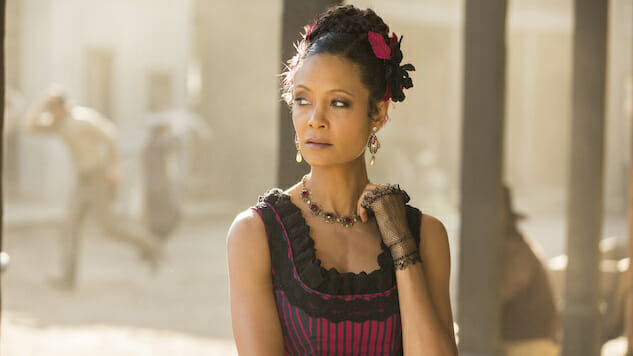Westworld Revels in Agony in “Trace Decay”
(Episode 1.08)
John P. Johnson/HBO
“Life is pain, Highness. Anyone who says otherwise is selling something.” – Westley, The Princess Bride
This entire season of Westworld, as thrilling as I’ve found it, has never felt completely novel. Perhaps that’s because just about every project spearheaded by a Nolan brother has the same pulp-philosophical feel, the same fascination with the human psyche, even many of the same filming and narrative techniques. Seriously, they must have signed some sort of pact that every one of their projects would feature an old person monologuing over some sweeping, mysteriously moving montage.
As Maeve and Bernard and Dolores and Teddy experienced completely lucid flashbacks to their past lives in “Trace Decay,” I was struck by my own, human, relatively hazy flashback to Memento, the last Nolan brothers work to deal explicitly with memory. Guy Pearce’s Leonard, in retrospect, could easily have been the template for Westworld’s hosts: defined by an inability to piece together his own true narrative, doomed to experience emotions with no understanding of why, manipulated by malevolent people with malevolent ends. Can you imagine Leonard’s rage if his retrograde amnesia were not only to disappear, but if he were able to access perfect, first-person point-of-view experiences of his horrifying actions in that film? (Actually, such a condition exists.)
The human characters of Westworld have never been the reason to watch this show. Especially after “Trace Decay,” it feels like they’re running in defined, archetypal tracks: of course William’s going to turn; of course Charlotte Hale and Ford are locked in a high-stakes battle of wits and one is going to make a crucial mistake. Even the Man in Black (William in the present?!), one of the early episodes’ hooks—if only because of Ed Harris’ menacing performance—has settled into the well-traveled “old guy with nothing to lose” trope. Even though the humans’ motives are still, for the most part, mysteries that we’ll witness unravel over the final two installments of the season, they don’t feel quite original. It’s hard to care so much about their stories on more than a superficial level.
New life, on the other hand, has been considered a miracle for millennia of human history, and here, in the realm of its slowly awakening hosts, Westworld has repeatedly nailed its execution. Last night’s episode gave us four separate points on the path toward real existence—which it’s now more or less clear lies at the center of the maze—but each of Bernard, Dolores, Teddy and Maeve seem to be hurtling toward the same conclusion: pain. Real, searing, gut-shredding pain, the type of which Ford will not allow Bernard to feel, perhaps because he knows that this is the answer and doesn’t want his most loyal servant developing an independent mind.
-

-

-

-

-

-

-

-

-

-

-

-

-

-

-

-

-

-

-

-

-

-

-

-

-

-

-

-

-

-

-

-

-

-

-

-

-

-

-

-








































